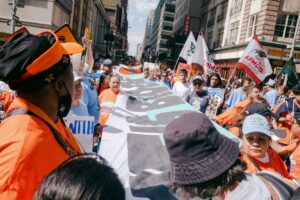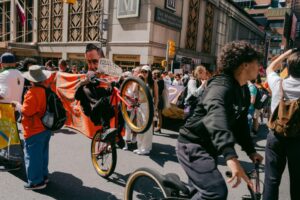
BY TONY LIPKA
Tens of thousands of New Yorkers gathered in Midtown this past Sunday to protest America’s reliance on fossil fuels.
Proceeding the United Nations Climate Ambition Summit that was held in Manhattan on September 20th, The March to End Fossil Fuels took place between West 56th Street and Broadway to 1st Avenue and 49th Street.
The scene was lively and the crowd was seemingly never-ending. Traffic was jammed, and the roads were packed with protesters young and old, carrying everything from small handmade signs, to lengthy banners stretching almost half a block. Reporters and photographers climbed atop trash cans and electrical boxes to get an overview of the event.
The central goal of the march was to push President Biden to take action against the United States’ reliance on fossil fuels, to advocate for clean energy, and to speak out about our changing climate.

Before it kicked off, protesters and the media crowded around a stage to capture members of the US Congress, Senate, and activists speak on the everpresent issue that is climate change.
Congressman Jamal Bowman was energetic upon entering the stage and emphasized issues like misused government subsidies, and the lack of accountability for American corporations. “There’s so many examples of the climate catastrophe we are living in,” he stated after leading the crowd through a spirited chant.
He continued, “We see barren land now because of the heat in so many parts of the world, which leads to mass migration, which leads to limited resources, which leads to conflict.” Realizing this he says, may seem like “common sense to us, but unfortunately, the powers that be continue to operate under the corporate power regime.”
As for those who weren’t on stage, longtime activist for social justice and United for Peace and Justice founder Leslie Cagan, was in the mix, rubbing elbows with fellow marchers.

For her, witnessing the destruction of Hurricane Sandy led her to become passionate about climate issues. “I mean every single day is a climate crisis,” she said. “The climate issue, very quickly I understood, was connected to almost every other issue you can imagine, particularly the struggles for economic and social justice.”
From the crowd to the speakers, to the diversity of groups and their causes, it was clear that climate change is on the minds of many, and to Cagan a march like this one was necessary.
“From time to time we need to gather in the largest ways we can to send the strongest message possible,” she said.
